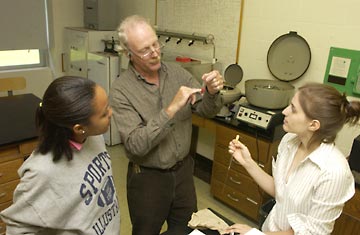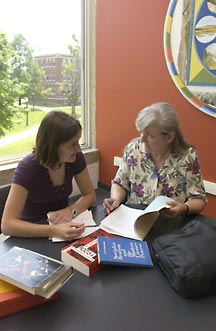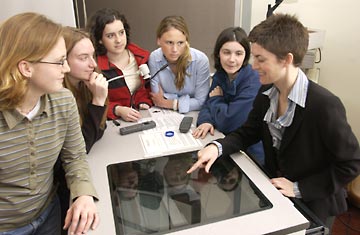Table of Contents
Are Faculty Teaching the Right Things and Are Students Learning the Right Things in Higher Education Today?
Professor and Chair of Biology Thomas Budd works with two students in a lab exercise. Participants in the “teaching” forum agreed that today's citizens need a fundamental understanding of the life sciences. Even the fundamental questions begged for definition and elaboration. Are we achieving the right outcomes? How is St. Lawrence doing in this area? Even more basically: what's “right” and what's not?
As participants in this forum quickly discovered, even liberal arts graduates with experience in the benefits and outcomes of this distinctive type of higher education disagree about what's “right” to teach and to learn in college.
Trustee facilitators Karen Diesl Bruett '66 and John Loughlin '79 invited participants—primarily alumni who graduated from the 1950s through the 1980s--to air their definitions of “right” as the forum opened. First in private “free writing,” then in small groups of six to eight , and finally together as a full group, participants raised questions and posed challenges.
Don Rose '64, retired director at Intel, Inc., urged colleges to graduate “global citizens” who each study a small list of subjects, an understanding of which he believes is necessary for responsible citizenship. His list would include the biology and ethics of genetic engineering, the science of global warming, analysis and interpretation of statistics and statistical reports, and international economics.
Allen Splete '60, retired president of the Council of Independent Colleges and Universities, also spoke on behalf of “citizenship education.” He noted that college students are not participants in the political process in ways that are meaningful because they lack trust in the democratic process. Yet when they graduate, they will discover the necessity of using that process to effect change in some of the largest issues our world will face. As citizens, Splete stressed, our graduates “must be able to evaluate choices.”
Associate Professor of Modern Languages and Literatures (Russian) Ruth Kreuzer meets with a student in a quiet corner of Owen D. Young Library, which was renovated to make possible scenes such as this with Campaign St. Lawrence funds. Picking up the theme of contemporary issues, physician Ronald Burkman '65 stressed the rapidity of change in today's society, and said that rather than having all college students examine specific disciplines, he would urge colleges to stress “core competencies” such as teamwork, communication, discernment and evaluation of ethical issues, and critical thinking.
Scott Stewart '81, who recently joined the faculty at Boston University to direct its graduate investments management program, echoed the belief that prescribing specific disciplinary studies in order to anticipate the future would be very difficult, but that a college education should “create several possibilities for graduates to fulfill career and life goals.” David Areson '71 added that colleges should offer students a balance of academic and experiential learning in order to prepare them for a life that itself aims for balance.
Ruth Carling Budlong '59 wondered if choice is actually an impediment to learning. How, she asked, can students navigate the myriad possibilities? At what point can students appreciate the integration of knowledge? And should colleges provide more direction?
Jim Snedeker '71, P'02 P'06, Trustee Sheldon Johnson '68, Paul Fideler '58, Pamela Stewart '82 and Sam Sammis '60 all picked up threads of these major themes: should a college teach a core curriculum of subjects? If so, what should those subjects be: A collection of disciplines that relate to contemporary issues or courses of enduring interest? Western civilization or Western and non-Western ideas? Is there too much emphasis on globalization and too little emphasis on passing on an enduring body of knowledge? Should a college allow students to gain competencies in ways that relate to individual interests and needs? If this is a preferred structure, when should integrated experiential learning have the greatest benefit? What is the contemporary iteration of “breadth and depth?” If each college might be allowed the latitude of choice, how, then, would outcomes be measured? Is it even possible to measure outcomes of collegiate education?
Diesl and Loughlin recognized that no single answer would resolve all thoughtful concerns, so they asked instead for the group's consensus on questions to address to President Sullivan. Here, again, variety of perspective rather than consensus dominated the discussion.
Assistant Professor of Philosophy Erin McCarthy, right, learned digital photography and scanning at St. Lawrence's new Center for Teaching and Learning so she could bring images of her trips to Asia into her classroom to make Asian philosophy come alive for her students. How does St. Lawrence examine the balance between timely and timeless knowledge and competencies?
How is St. Lawrence preparing its students to take their place as informed, responsible, ethical citizens?
How can St. Lawrence define the attributes all its graduates will share?
Does St. Lawrence have a core curriculum and how does the University incorporate contemporary issues into the curriculum?
Reported by Lisa Cania M'82
Associate Vice President of University RelationsAt the plenary:
The last of the four questions was addressed to President Daniel F. Sullivan in the closing plenary session.
President Sullivan: “St. Lawrence's faculty have adopted core goals and objectives, but not a core set of courses that every graduate is expected to have studied. We are guided by the University's mission statement, which says, ‘The mission of St. Lawrence University is to provide an inspiring and demanding undergraduate education in the liberal arts to students selected for their seriousness of purpose and intellectual promise.' These goals are achievable in different ways. A core curriculum is a defensible way of organizing a curriculum, but not one that St. Lawrence's faculty have chosen to adopt.”
Readings:
Eve Walsh Stoddard and Grant H. Cornwell, "Peripheral Visions: Towards a Geoethics of Citizenship ,” from Liberal Arts , Summer 2003
"Greater Expectations: A New Vision for Learning as a Nation Goes to College"


